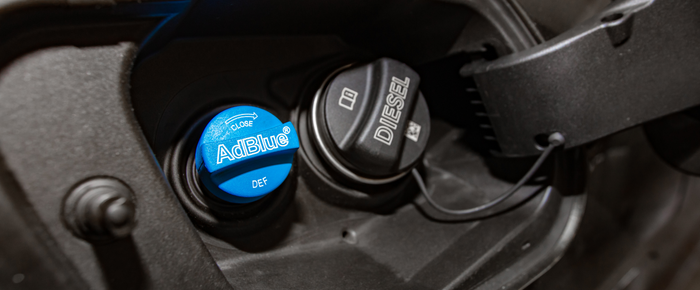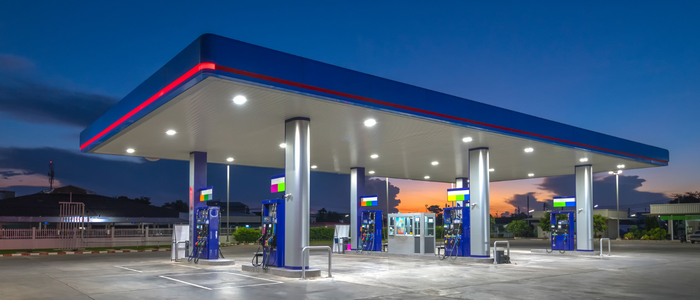
What is AdBlue
AdBlue is a solution in modern diesel vehicles designed to reduce harmful nitrogen oxide emissions. With growing concerns about air pollution and the environmental impact of diesel vehicles, AdBlue has become an essential component in reducing harmful exhaust emissions. In this article, GB Vehicle Leasing will explore what AdBlue is made of, and why it's essential for modern diesel vehicles.
What is AdBlue used for?
AdBlue is utilised in diesel vehicles to minimise harmful nitrogen oxide (NOx) emissions produced by burning diesel fuel in an engine. These emissions can be a major contributor to air pollution and can negatively impact human health.
To convert the NOx emissions, AdBlue is injected into the exhaust system through a separate tank and is metered into the exhaust gases before they enter the SCR catalyst. The heat from the exhaust gases causes AdBlue to break down into ammonia and carbon dioxide, which reacts with the NOx emissions and converts them into harmless nitrogen and water vapor.
Using AdBlue is an effective way to reduce harmful NOx emissions from diesel vehicles and improve air quality. AdBlue is now a legal requirement for all diesel vehicles manufactured after 2016 in the European Union and other countries that follow similar environmental regulations.
What is AdBlue made of?
AdBlue is made up of high-purity urea and deionized water combined. The urea used in AdBlue is synthetically produced and is of a very high quality. The deionized water used in AdBlue is purified through a process that removes all mineral ions, which could cause blockages or other issues in the vehicle's exhaust system.The mixture of urea and water in AdBlue is precisely controlled to ensure that it meets international standards and is compatible with the SCR system in modern diesel vehicles.
Is AdBlue flammable?
No, AdBlue is not flammable. AdBlue is a non-flammable, non-explosive, and non-hazardous solution primarily composed of purified water. In fact, AdBlue is a clear, odourless, and non-toxic solution that is safe to handle and transport. Therefore, it does not pose a risk to the environment when used correctly. However, like any other chemical solution, it should be stored and handled according to manufacturer recommendations to maintain its quality and effectiveness. It is also essential to avoid contaminating AdBlue with substances that could affect its performance or the operation of the SCR system in vehicles.
How much AdBlue does my car need?
Several factors influence the quantity of AdBlue needed for your car, including the size of your car's AdBlue tank, your driving style, and the conditions under which you drive. Typically, diesel vehicles have a smaller AdBlue tank than the fuel tank and require periodic refills, usually during regular service intervals. The AdBlue tank's size can vary depending on the vehicle model, but it is typically up to 20% of the fuel tank's size. A low AdBlue tank level warning will alert you when a refill is necessary, providing ample time to replenish it before it runs out. It's essential to refer to your vehicle's owner's manual for specific information on how much AdBlue your car will use and when it should be refilled.
Does every diesel need AdBlue?
Not every diesel engine requires AdBlue, but most modern diesel vehicles with a Euro 6 or later emissions standard use AdBlue to reduce NOx emissions. The Euro 6 emissions standard was introduced in 2015 and set strict limits on exhaust emissions, including NOx.
Diesel vehicles with a Euro 6 or later emissions standard are equipped with a Selective Catalytic Reduction (SCR) system that requires AdBlue to function correctly. It is essential to check your vehicle's manual to determine whether your diesel engine requires AdBlue.

How long does AdBlue last?
The longevity of AdBlue depends on several factors, such as the size of the AdBlue tank in your vehicle, driving conditions, and how efficiently your vehicle's selective catalytic reduction (SCR) system operates. On average, a gallon of AdBlue can last anywhere from 300 to 500 miles under typical driving conditions. However, this can vary. Many modern vehicles equipped with SCR systems have a gauge or warning system that alerts you when the AdBlue level is getting low, so you can refill it as needed. It's essential to keep an eye on the AdBlue level and refill the tank when necessary to ensure that your vehicle's emissions control system continues to operate effectively.
Once opened, the shelf life of AdBlue can vary depending on storage conditions and the presence of contaminants. In general, when stored correctly, an opened container of AdBlue can remain effective for up to 12 months. When storing AdBlue, it should be shielded from direct sunlight or UV light, as exposure to UV radiation can degrade its quality. Also, AdBlue containers should be sealed tightly when not in use. Exposure to air can lead to the formation of impurities and reduce its effectiveness. It's essential to check the manufacturer's guidelines and any specific storage instructions provided on the AdBlue container.
Where can I buy AdBlue?
AdBlue is readily available at most fuel stations and service stations. You can also purchase AdBlue at auto parts stores and online retailers. When buying AdBlue, it is important to ensure that the product meets the ISO 22241 standards for quality and purity. You can check the product's packaging for this information or ask the retailer to confirm.
Although the price of AdBlue varies depending on where you purchase it, it is typically a minor expense. If you’re refilling the AdBlue tank yourself, make sure to follow the manufacturer's guidelines on how to refill it correctly, including the recommended quantity and filling procedure.
In conclusion, if the have a diesel car, it’s important to keep your AdBlue tank topped up to ensure that your vehicle is operating efficiently and meeting emission standards. By using AdBlue when required, we can all contribute to creating a cleaner and healthier environment for ourselves and future generations.
If you’ve found this article interesting, visit our Facebook page for more tips and motoring advice. Also, view our related article - What is climate control in a car? Also, if you're interested in leasing a vehicle, click here to view our current special offers.
About The Author: Charlotte Kennedy
Charlotte joined the GB Vehicle Leasing team around 6 years ago starting out as an apprentice and is now being a key member of our marketing team.
Find Out More About CharlotteLatest Posts

Free Nationwide Delivery Explained
Learn more about free convenient delivery...

Cupra Tavascan Review: All The Highlights
The Cupra Tavascan has arrived, and...

Kia EV3 Review UK
Meet the Kia EV3, the all-electric...

Dacia Spring UK Review
Here, we take an in-depth look...

Cheap SUVs 2025
Take a look at our picks...



































